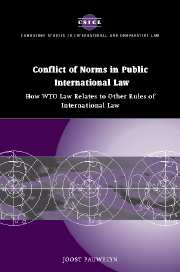 Conflict of Norms in Public International Law
Conflict of Norms in Public International Law Book contents
- Frontmatter
- Contents
- Preface
- Table of cases
- List of abbreviations
- Introduction
- 1 The topic and its importance: conflict of norms in public international law
- 2 The case study: the law of the World Trade Organization
- 3 Hierarchy of sources
- 4 Accumulation and conflict of norms
- 5 Conflict-avoidance techniques
- 6 Resolving ‘inherent normative conflict’
- 7 Resolving ‘conflict in the applicable law’
- 8 Conflict of norms in WTO dispute settlement
- Conclusions
- Bibliography
- Index
- CAMBRIDGE STUDIES IN INTERNATIONAL AND COMPARATIVE LAW
1 - The topic and its importance: conflict of norms in public international law
Published online by Cambridge University Press: 07 July 2009
- Frontmatter
- Contents
- Preface
- Table of cases
- List of abbreviations
- Introduction
- 1 The topic and its importance: conflict of norms in public international law
- 2 The case study: the law of the World Trade Organization
- 3 Hierarchy of sources
- 4 Accumulation and conflict of norms
- 5 Conflict-avoidance techniques
- 6 Resolving ‘inherent normative conflict’
- 7 Resolving ‘conflict in the applicable law’
- 8 Conflict of norms in WTO dispute settlement
- Conclusions
- Bibliography
- Index
- CAMBRIDGE STUDIES IN INTERNATIONAL AND COMPARATIVE LAW
Summary
The measure of success which is achieved in eliminating and resolving conflicts between law-making treaties will have a major bearing on the prospect of developing, despite the imperfections of the international legislative process, a coherent law of nations adequate to modern needs.
What follows is about ‘conflict’, more particularly conflict between ‘norms’ of ‘public international law’. The prime example referred to will be the law of the World Trade Organization. The crucial question in this case study is: how does WTO law relate to other rules of public international law? The internal hierarchy between norms which are part of the WTO treaty is also addressed. We not only examine these questions in abstracto. We also assess them in the more concrete context of WTO dispute settlement.
Conflict
The scope of this work is limited to situations of ‘conflict’ between legal norms. The main question is, therefore: when there is a conflict between two norms, which of the two norms should be applied? This question relates to the hierarchy of norms in international law.
Before suggesting ways to resolve conflict of norms, we shall have to define first what is meant by ‘conflict’. In many instances, what may seem like a conflict will not be a conflict but only a divergence which can be streamlined by means of, for example, treaty interpretation.
- Type
- Chapter
- Information
- Conflict of Norms in Public International LawHow WTO Law Relates to other Rules of International Law, pp. 5 - 24Publisher: Cambridge University PressPrint publication year: 2003


